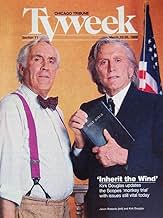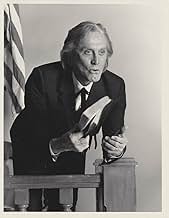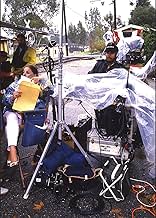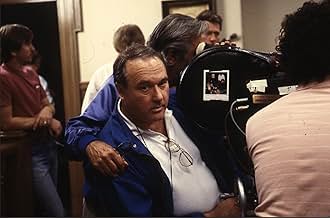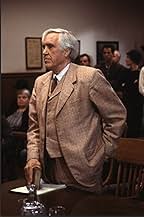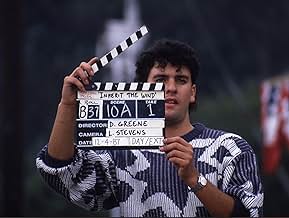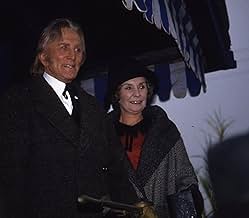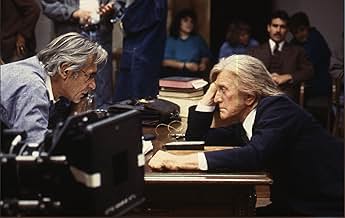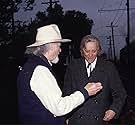Füge eine Handlung in deiner Sprache hinzuA biblical orator opposes a liberal lawyer defending a man for teaching Darwinism in the 1920s South.A biblical orator opposes a liberal lawyer defending a man for teaching Darwinism in the 1920s South.A biblical orator opposes a liberal lawyer defending a man for teaching Darwinism in the 1920s South.
- Regie
- Drehbuch
- Hauptbesetzung
- 2 Primetime Emmys gewonnen
- 2 Gewinne & 1 Nominierung insgesamt
- Bailiff
- (as Thom McCleister)
- Radio Newsman
- (as Richard Gilbert Hill)
Empfohlene Bewertungen
This isn't to say its bad, its not. The problem is that compared to the original Spencer Tracy film this film comes off as a good summer stock to the originals Broadway show case.
The cast is game. Kirk Douglas is perhaps a bit odd at first as the William Jennings Bryan character, but after a few minutes he slips into the groove and all is fine. Jason Robards' is excellent, unfortunately there is something about the way this was put together for TV that kills his momentum in the home stretch.
Seeing this with out commercials doesn't help since the pauses still are there.
If its on try it, but if you must see some version of this go for one of the other two.
In real life of course William Jennings Bryan was thoroughly cured of the presidential bug by 1925. He was still very much an influence in the party, especially in rural areas such as Eastern Tennessee where the Scopes Trial took place. In real life Bryan would have been 68 in 1928 had he lived and I'm willing to bet he'd have fought mightily against the nomination of the Roman Catholic Alfred E. Smith.
In this version a lot of business is eliminated including the contempt citation that defense lawyer Henry Drummond is given and a favorite scene of mine where Brady is holding court for the press in the hotel restaurant, enjoying heaping helpfuls of roast beef and mashed potatoes while Drummond sits in the foreground with a tuna sandwich and a glass or milk.
The confrontation climax with Brady and Drummond is still basically the same with the added dialog about Brady maybe running for president again to bring the USA back to God. Again written for the 1988 television audience.
Jason Robards, Jr. is far closer to the truth of Clarence Darrow in his Henry Drummond than Spencer Tracy. Darrow was not as noble a creature as Tracy makes him out, but his performance did get him an Academy Award nomination. Robards is a lot more sneaky, still for me the best interpretation of Clarence Darrow is Orson Welles as Jonathan Wilk in Compulsion.
Kirk Douglas gets reunited with his Spartacus co-star Jean Simmons playing Mrs. Brady. By all accounts the real Mrs. Bryan was a very wise woman capable of a brake on her high flying husband when needed.
When I wrote a review for the 1960 Inherit the Wind which I did see in theaters back in the day, I said that the film was done from a quaint nostalgia point of view about what silly things we believed and fought over and how America had grown up in the interim. In 1960 who would have believed that fundamentalist Christianity would have a stranglehold on one of our major parties. This version of Inherit The Wind sadly takes that into account.
Jason Robards played Drummond/Darrow very well - in the tradition of Muni, Tracy, and Melvyn Douglas. But it was the performance of Kirk Douglas as Brady/Bryan that was unique. As I have mentioned elsewhere in these reviews, Bryan did have valid reasons to dislike Darwinism aside from religious feelings. The issue of Social Darwinism, created by an English elitist snob named Herbert Spencer, had been grabbed by various people in power positions in big business and politics that suggested that the best people were the top of the evolutionary tree - and that big business had the right to destroy small competitors due to "survival of the fittest". Bryan hated this idea, as opposite to Jeffersonian Democracy. He actually intended, after his own humiliation on the witness stand by Darrow to put Darrow on the stand to explain his acceptance of Social Darwinism. Judge Raulston, the trial judge, refused to allow this.
If that had been brought out in this production, it would have set it apart and given a more balanced view of the two parties who clashed in Dayton. Instead, Douglas played Brady like a revivalist (similar to Begley, without Begley's physical resemblance to Bryan). But he also kept trying to keep up the friendly feelings that Darrow and Bryan had when both were fighting on the same side on political issues from 1893 to 1908. While all the productions include those moments of nostalgia between them, this attempted to suggest that Douglas/Brady hoped to "save" the soul of Robards/Drummond. It was a curious idea, but it just did not seem realistic (given their diametrically opposite views on evolution and the Tennessee law). I give this a 7 for the production but the approach was a misfire.
Wusstest du schon
- WissenswertesThe real William Jennings Bryan ran for President three times: 1896, 1900, and 1908. Bryan was the first Presidential candidate to extensively barnstorm during a Presidential campaign in an era when most candidates did not. Although it's suggested that he might be contemplating a run in the next election, which would have been in 1928, it's highly unlikely. He did serve in public office twice - as Congressman from Nebraska from 1891 to 1895 and as Secretary of State under Woodrow Wilson from 1913 to 1915, when he resigned over the country's policy toward Germany after the Lusitania was sunk. Despite his fundamentalist Christian beliefs, he was considered as Liberal and Progressive, supporting anti-Imperialist policies and trust-busting.
- PatzerIn several courtroom scenes when the focus is on Bertram Cates, the actor, Kyle Secor, wears glasses in which you can see the reflection of the production lights as well as white flags used by the production staff to mute the lights. In the 1930s, courtrooms would have utilized electric lights with a milk glass lamp shade known as a "schoolhouse light".
- Zitate
Rachel Brown: I don't understand it, and what I do understand I don't like. I don't believe I came from apes and monkeys. You see, I really haven't thought very much. I was always afraid of what I might think. It seemed safer not to think at all. Maybe - maybe what Mr. Darwin wrote is bad. Bad or good I think ideas have to come out. I think they should be heard. I don't think they ought to pass laws against them.
- VerbindungenFeatured in The 40th Annual Primetime Emmy Awards (1988)

